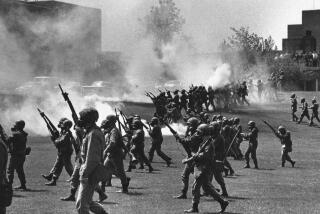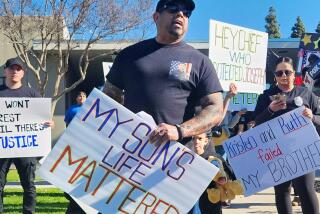Quietly accepting another Iraq death
- Share via
Hemet — I knock on the house with the flag out front. A cousin comes to the door, then asks me to wait on the porch while she checks to see if Kenny Stanton’s parents are strong enough to greet a visitor.
“OK,” she says a few minutes later, swinging open the screen door. “Come on in.”
Gloria Stanton, Kenny’s mother, sinks into the sofa, crushed by grief. She manages a gracious smile, her eyes red-rimmed and weary. Daughters Terry and Brandie are with her, and before long Kenny’s dad, Kenny Sr., joins us along with brother Mario, 17.
“I’m sorry,” I say, and the words feel ridiculously inadequate.
Cpl. Kenny F. Stanton Jr., 20, was killed in Baghdad on Oct. 13, when a bomb exploded near his vehicle. He was the third graduate of Hemet High School killed in Iraq, and his death came in one of the bloodiest months since the war began.
“The Plague that Hit Hemet,” one of Stanton’s acquaintances called it in an entry on the fallen soldier’s MySpace website.
Stanton’s family has erected a memorial in the living room, with flickering candles and photos of Kenny, a nice-looking kid with a sweet smile. He loved words, say his parents. He worked for the school newspaper and wanted to be a writer, a poet and teacher. But he chose to join the Army first.
His family can’t say exactly why, although a close cousin, Michael Islas, says Kenny was fascinated by weaponry and wanted to see the world, if not necessarily Iraq. His parents tell me Kenny’s grandfather, a Vietnam vet, tried to talk him out of it.
“He wanted to pay him not to go,” says Mr. Stanton, a pressman for a label company. “He was ready to write him a check for $40,000 to go to college.”
“I said, ‘Sweetheart, I don’t want you to go,’ ” Gloria Stanton says. “He said, ‘But Mom, I could do some good.’ ”
In the end, they supported him. How could they argue with a young man who just wanted to do something for his country and make his parents proud?
The whole family drove to LAX when Kenny shipped out.
“We couldn’t cry,” Mr. Stanton says. “We didn’t want him to see us cry. But when he left and we turned to leave, we all had tears in our eyes.”
Mr. Stanton says he didn’t support the war but supported his son’s decision.
“I support our troops. That’s all I want to say.”
Hemet is a town east of Lake Elsinore with just under 70,000 residents, and Mayor Robin Lowe has been struck by the sacrifice it has made. Another local high school, West Valley, also lost a former student to the war, she says, bringing the local body count to four.
Lowe ordered the City Hall flag to fly at half staff for Stanton, just as she did in June when Marine Cpl. Michael Estrella, also 20, was killed.
“Hemet has many retired military living here, and has always been a center of patriotic pride,” Lowe says. “I think our core beliefs are very firm and concrete when it comes to the United States and what it stands for.”
Stanton’s parents had suggested I get in touch with Aracely Colmenares, one of Kenny’s closest friends at Hemet High. I give her a call, and we meet in Mary Henley Park, where she and Kenny used to sit under a tree, look up at the mountains and talk about everything.
They weren’t a couple, just friends, but he was the one she called if she needed someone to talk to. She recalls how upset he was by the Sept. 11 attack. Although she wouldn’t have pegged him a military man, she says he wanted to do something, someday. Something to make his family proud.
The Armed Forces Career Center, where Stanton enlisted, is not far from the park. It’s on the main drag, Florida Avenue, conveniently if not ironically located in the same shopping center as Target, with its big bull’s-eye out front.
There’s a Taco Bell, a Carl’s Jr. and a 99-cent Store. A See’s Candy store is two doors from the Jenny Craig weight loss center. The Army, Navy and Marine recruiting stations neatly complete this blending of American commerce and culture.
Army Sgt. 1st Class Ronnie V. Sarmiento tells me the nationwide goal of 80,000 annual recruits has just been topped, but he’s not at liberty to disclose the numbers in Hemet. I notice three youngsters in the office, though.
One tells me he might sign up but doesn’t want to talk about it. Another guy who’s thinking about it, 18-year-old Brent, is just out of Hemet High and says he hasn’t heard the news that three former students have been killed.
The third, 18-year-old Jessica Katrow, heard about Stanton’s death but is enlisting anyway to serve her country and experience something new.
“It’s sad, but it happened,” she says. “There’s nothing I can do.”
I ask if she wants to go to Iraq.
“I don’t want to,” she says, but she’ll take whatever comes her way.
When I walk into the office at Hemet High the first thing I notice is a young female in an Air Force ROTC uniform. She’s wandering behind the counter in crisp blue threads. Prominently displayed in the waiting area are brochures for the Navy (“accelerate your life”), Marines (“the few, the proud”) and Army (“who you become will be better than who you were”).
An assistant principal tells me no one can speak to me without permission from the district superintendent. Before leaving campus, I ask the assistant principal if it seems appropriate to display military recruiting brochures so prominently at a school that has lost three former students to war.
He politely tells me he thinks it’s a government requirement, and refers me again to the superintendent, who does not return my calls.
When the school bell rings, I talk to about 10 students as they leave.
Julian, a freshman wearing an ROTC uniform, hasn’t heard about the deaths of former Hemet grads, and he seems alarmed by the news. But he tells me he intends to follow the men in his family into the military.
Kyle, 16, says he heard about Stanton, but he’s still considering enlisting after high school.
“It happens,” he says, holding a binder on which he’s drawn a U.S. flag. “People die.”
He tells me none of his teachers have discussed Stanton or the war in class.
“In history? We’re studying the Puritans.”
Driving away, I find that I’m disturbed by the quiet acceptance of sacrifice to what has been a dubious mission from the beginning. I can’t help but remind myself that the architects of the war have risked no personal loss, staying the course with someone else’s children.
I ask Mayor Lowe if too many young people in Hemet, if not elsewhere, fall in line before they’re equipped to challenge the seduction of war, as well as the definitions of valor and patriotism.
“I don’t think anyone in this town -- anyone -- is promoting war,” she says, telling me she’ll never forget that 14 students from her own school, Inglewood High, died in Vietnam.
“None of us, especially those of us who lived through Vietnam, are promoting any war of any kind by this country, and I say that emphatically. I don’t think any teachers are promoting the war and I don’t think the recruiters are promoting war. What I do see is ... kids who are not really sure what to do with the rest of their life.”
And so they join, with patriotic intentions and hope for a better future.
Kenny F. Stanton will be laid to rest this week in Hemet.
More to Read
Sign up for Essential California
The most important California stories and recommendations in your inbox every morning.
You may occasionally receive promotional content from the Los Angeles Times.














